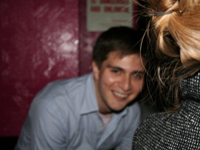By **Justin Alvarez**
 On Sunday, Ai Weiwei, one of China’s most prominent artists and outspoken critics of the communist regime, was detained at the Beijing Airport as he tried to board a flight for Hong Kong. No one has heard from him since.
On Sunday, Ai Weiwei, one of China’s most prominent artists and outspoken critics of the communist regime, was detained at the Beijing Airport as he tried to board a flight for Hong Kong. No one has heard from him since.
That same day police raided his Beijing home-studio compound as well as arrested and questioned his wife, Lu Qing, and eight staff members. The authorities carted away documents, laptops, and hard drives, not leaving a single item behind. Everyone was released as of late Sunday night, except for Weiwei and his friend Wen Tao. The current location of the 53-year-old artist is still unknown.
Weiwei joins a long list of human rights activists, lawyers, and writers who have recently been arrested, detained, or gone missing in the wake of a “jasmine revolution,” as anonymous calls for rallies have been circulating the Internet since mid-February. However, no such “jasmine rallies” have actually materialized.
On what charge has Weiwei been detained? “Inciting subversion of state power,” the same charge given to Nobel Peace Prize winner Liu Xiaobo before he received an 11-year prison sentence. A fervent Web communicator, Weiwei’s arrest suggests a crackdown on the limited open space recently allowed for free opinion on the Internet, particularly on popular Twitter-like microblogging sites, like Sina Weibo.
Since Monday, Sina Weibo editors have been busy deleting any posts related to Weiwei. However, netizens have started to adopt the slogan “Love the Future,” which looks and sounds very similar to Ai Weiwei’s name in Mandarin, as a new coded phrase to post on blogs as a form of protest. As word spread, the “love the future” messages were also removed, but China Digital Times was able to capture some of these messages before deletion:
—“We love the future, not for any one person, but because we hope the future will be even better. We love it here, and we hope it can become better.”
—“I really don’t dare believe that in this society, even love for the future can disappear.”
—“Justice doesn’t die; faith is forever. Love the future!”
The protest is a testament to Weiwei’s support for free speech in China, especially through the use of the Internet. For the past couple years, Weiwei and his staff have recorded his life through film, audio, and Twitter. The record is available for everyone to see. As Weiwei explains in a recent Tate Modern video introducing his “Sunflower Seeds” installation, “I always think art is a tool to set up new questions, to create a basic structure which can be open to possibilities…I want people who don’t have to understand art to understand what I am doing.”
In light of the situation, the arts group AW Asia stated on Tuesday they still plan to unveil Weiwei’s 12-piece sculpture, “Circle of Animals/Zodiac Heads,” at the Pulitzer Fountain outside the Plaza Hotel on May 2nd, with or without Weiwei present. He wouldn’t want it any other way.
Copyright 2011 Justin Alvarez
________________________________________________________________________
Justin Alvarez is a blog intern at Guernica. Read more about him here.
